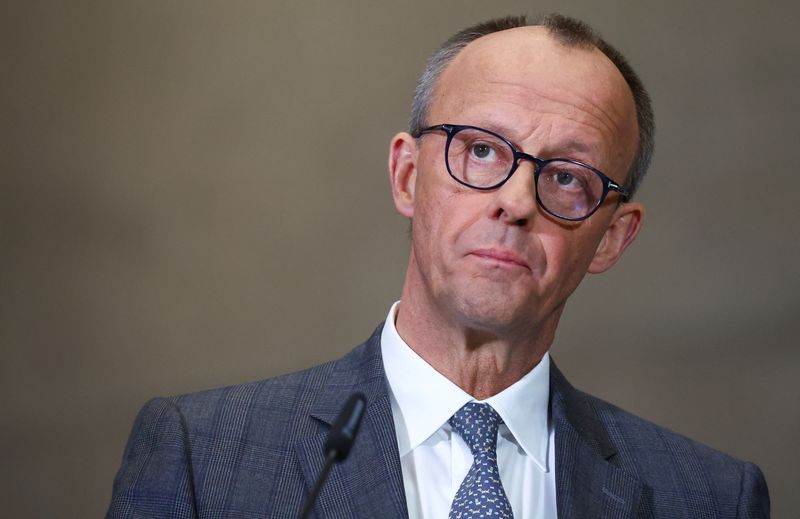By Sarah Marsh and Matthias Williams
BERLIN (Reuters) - The parties hoping to form Germany’s next government agreed to create a 500 billion euro infrastructure fund and overhaul borrowing rules, a tectonic spending shift that jolted markets on Wednesday on hopes of reviving Europe’s largest economy.
Friedrich Merz’s conservatives and the Social Democrats (SPD), who are in negotiations to form a coalition after a national election last month, will put their proposals to the German parliament next week.
But the Greens party, whose support is key to getting the reform through the outgoing parliament, refused to pledge its support, questioning why climate-friendly policies had not been included. Separately the far-right Alternative for Germany (AfD) joined the radical Left party in threatening legal action.
The U-turn in Berlin late on Tuesday marks a potential sea change in the euro zone economy after decades in which Germany’s neighbours have criticised it for holding regional growth back with excessive budgetary thrift.
The plans also envisage removing a self-imposed upper limit on defence spending, which has long seen Germany either missing or barely meeting NATO targets, and they indicate a wider realisation across Europe that it can no longer rely on the United States for regional security.
Economists say it remains to be seen whether a defence spending "surge" and an accompanying modernisation of Germany’s creaking infrastructure can improve the competitiveness which figures such as Mario Draghi, ex-chief of the European Central Bank, say is crucial to revive the euro zone’s economic growth.
Merz, Germany’s likely next chancellor, has seized the moment after the return of Donald Trump to the White House threw the transatlantic alliance into turmoil, and has underlined the urgency for Europe to strengthen its own defences.
Trump froze military aid to Ukraine after a bitter clash last week with its president, Volodymyr Zelenskiy, reinforcing fears that the U.S. could strike a deal with Russia to end the war in Ukraine while disengaging from Europe.
Economists and investors have long urged Germany to reform its constitutionally enshrined state borrowing limits - known as the "debt brake" - in order to free up investment and support an economy that has contracted for the past two years.
’BIG BAZOOKA’
The reform would mark a rollback of borrowing rules imposed after the 2008 global financial crisis that many now say are outdated and keep Germany in a fiscal straitjacket.
"A really big bazooka," wrote Berenberg economist Holger Schmieding. "These proposals for an immediate loosening of Germany’s fiscal rules will likely be enacted. They are a fiscal sea change for Germany."
The euro hit its highest level in nearly four months on Wednesday after the news.
Germany’s blue-chip index jumped to near a record high. Construction firms were among the top gainers, with Heidelberg (ETR: HDDG ) Materials , the world’s second-largest cement maker, up 16% at the top of Frankfurt’s blue-chip index.
European defence company shares have also soared as momentum to ramp up spending gathers pace. German defence companies Rheinmetall (ETR: RHMG ) , Hensoldt , Thyssenkrupp (DE: TKAG ) and Renk (DE: R3NK ) had notched up gains so far this week of between 17% and 30% as of Wednesday.
Germany’s move also throws down the gauntlet to France, where President Emmanuel Macron wants to bolster defence spending but is struggling to tame an unruly budget deficit.
Merz said his CDU/CSU conservative bloc and the SPD would submit a motion to parliament next week to amend the constitution so defence expenditure above 1% of economic output is exempted from debt brake rules.
A commission of experts will separately develop a proposal for modernizing the debt brake to boost investments on a permanent basis.
But the Greens’ support for the plans remains "an open question," their parliamentary leader Katharina Droege said.
"There are various changes to the Basic Law that are being made; they are poking holes in the debt brake a bit like Swiss cheese."
’ORGY OF DEBT’
According to a poll by INSA, 49% of Germans support loosening the debt brake while only 28% are against. But changing the debt rules and creating a special fund require a two-thirds majority in parliament.
The conservatives and SPD are rushing to get the moves passed in the outgoing parliament, given far-right and far-left parties will have a blocking minority in the new parliament after scoring strongly in last month’s election.
The AfD threatened legal action against what it called an "orgy of debt". The radical Left party has threatened a legal challenge if Germany issues new debt to fund defence expenditure.
Business lobbies welcomed the plans but said they need to be accompanied by regulatory reforms.

"Pending more clarity on this issue, and being mindful of some execution risk, we believe this is one of the most historic paradigm shifts in German postwar history," said Robin Winkler, chief economist at Deutsche Bank Research.
($1 = 0.9351 euros)